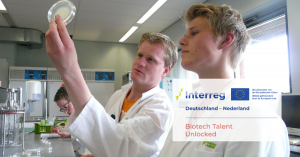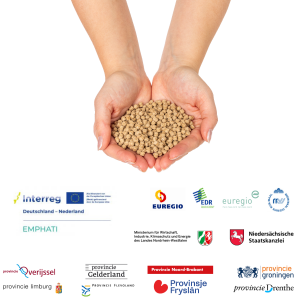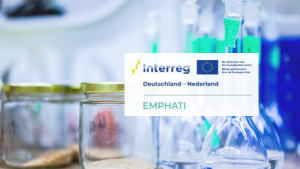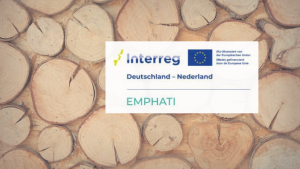
The BIO Cooperative proudly announces the launch of the subproject ‘Processing Possibilities for Wood Fiber-Reinforced PHA (PWP)’, which is part of the cross-border Interreg project EMPHATI. The project, submitted and executed by Triple Benefit from Enschede (Netherlands) and Holzmühle Westerkamp GmbH from Visbek (Germany), focuses on innovative methods for processing wood fiber-reinforced polyhydroxyalkanoates (PHA). PHA is a biodegradable biopolymer produced by bacteria, offering a sustainable alternative to conventional plastics. However, it faces challenges such as a narrow thermal processing window and complex flow properties.
“With this project, we aim to show that sustainable biopolymers are not only an environmentally friendly choice, but also practically and economically viable,” says Kolja Ostendorf, R&D Scientist at Holzmühle Westerkamp. “By combining innovative techniques with natural fibers, we are opening up new possibilities for applications that contribute to a circular economy.”
New Processing Techniques
The pilot project runs from October 2024 to July 2025. A key goal of the project is to test alternative processing techniques such as panel sintering and flow-moulding. These methods have been developed to address the challenges of PHAs, such as their limited thermal stability and complex flow properties. Panel sintering shortens the material’s residence time, while flow-moulding applies an innovative mould temperature control. Both methods can enable more efficient processing of PHA, while the addition of wood fibers enhances mechanical properties such as tensile stiffness. A considerable costprice reduction can be achieved, because products can be constructed thinner and on top of that material costs are reduced by the addition of wood. Also mould costs can be reduced drastically using the new conversion technologies.
Cost-Effective Solutions for Sustainable PHA Use
Triple Benefit from Enschede brings its extensive experience in circular innovation to this project. The company specializes in developing processing methods like panel sintering and flow-moulding, originally designed for recycling plastic waste in low- and middle-income countries. The company expects these existing technologies can be adapted to convert PHA or wood-reinforced PHA compounds into marketable products.
“Our focus is on finding cost-effective solutions, particularly for markets where low CAPEX and low OPEX are a precondition,” says Rik Voerman, project leader at Triple Benefit. “We are excited to explore how these technologies can contribute to PHA processing.”
‘Exciting Challenge’
Holzmühle Westerkamp GmbH specializes in the processing of sawmill by-products into wood flours, wood fibres and wood granulates. The company uses advanced technologies and can therefore offer products with different particle sizes and distributions, which is crucial for optimizing the processing properties of fibre-reinforced polymers. This expertise in fine-tuning particle size is an important advantage for the project, as it helps to improve the processability and material properties of PHA-composites.
“It’s an exciting challenge to process these new materials, especially because we can draw from our expertise in processing natural fibers,” says Kolja Ostendorf. “By combining wood fibers with PHA, we can not only reduce material costs but also improve functional properties. This approach demonstrates that sustainability and performance can go hand in hand. We look forward to learning more about the innovative processing methods needed specifically for PHA and the opportunities these materials offer.”
More Than Material Development
In addition to technical developments, the project focuses on improving the recyclability of the materials. Especially with cost-intensive polymers such as PHA, it makes sense to investigate their recyclability and how they behave in combination with wood fibers. Moreover, the environmental impacts of the innovations are extensively analyzed through a life cycle analysis (LCA). This analysis provides insights into the ecological impact of the new materials and production processes, from raw material to end-of-life.
Future Applications
The results of this research promise to open up new opportunities for sustainable applications in various sectors, including agriculture, construction, and medical devices. Wood fiber-reinforced PHA compounds could, for example, be used in biodegradable packaging as cultivation aids, or as a base for medical products that generate less waste.
With the combined expertise of Triple Benefit and Holzmühle Westerkamp, this cross-border project offers not only technological innovation but also a tangible contribution to a more sustainable future.
About EMPHATI
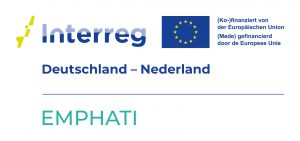
In the EMPHATI project, Dutch and German companies and knowledge institutions are collaborating on the development of new sustainable and environmentally friendly products based on PHA (polyhydroxyalkanoates). PHAs are natural plastics that are biodegradable. As such, they offer a promising and sustainable alternative to fossil-based plastics derived from oil. As a partner, the BIO Cooperative bridges the gap to the broader plastics processing industry in Northern Netherlands. There is still budget available for new partners who wish to join the consortium.
Current project partners in the EMPHATI project include: 3N Kompetenzzentrum e.V., Holzmühle Westerkamp GmbH, Ecoras, bekuplast GmbH, TKT Kunststoff-Technik GmbH, H&P Moulding Emmen B.V., IST Ficotex e.K., Hochschule Bremen, NHL Stenden, BINDER 3D B.V., Avans Hogeschool, Hanzehogeschool Groningen, Netzwerk Oberfläche NRW e.V., WYDO NBD B.V.
Source article: BIO Cooperative
Photo: Pexels (FWStudio)

